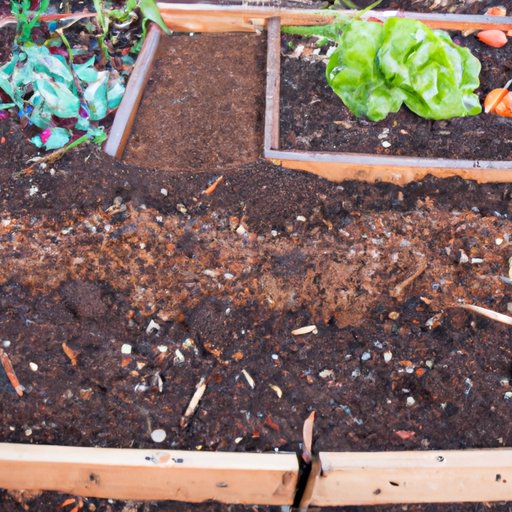Introduction
Raised beds are an excellent way to create a productive and attractive garden. By elevating the planting area, you can improve soil drainage and add additional nutrients to the soil. But when it comes to what soil to put in raised beds, there are a few things you should consider. This article will explore the different types of soil available for raised beds, as well as provide tips on how to choose the best soil mix for your garden.
Definition of Raised Beds
Raised beds are simply elevated gardens that are typically built with wood, brick, or stone. They are filled with soil and then planted with vegetables, flowers, herbs, or other plants. The raised beds are great for growing a variety of plants, as they can be tailored to meet the needs of each individual plant. The added height also helps to improve drainage, as excess water can easily be drained away from the roots of the plants, rather than sitting stagnant in the soil.

Overview of Different Soil Types for Raised Beds
There are a few different types of soil that can be used in raised beds. Each type of soil has its own benefits and drawbacks, so it’s important to choose the one that will best suit your plants’ needs. The most common types of soil for raised beds include organic soils, inorganic soils, compost, and clay soils.
Benefits and Drawbacks of Common Soil Varieties for Raised Beds
Organic soils are made up of natural materials such as composted leaves, grass clippings, and aged manure. These soils are great for providing vital nutrients to plants, while also improving aeration and moisture retention. However, organic soils can be more expensive than inorganic soils and may not last as long as inorganic soils.
Inorganic soils are made up of sand, gravel, and other mineral particles. These soils are generally cheaper than organic soils and have better drainage properties. However, inorganic soils do not contain any beneficial nutrients for plants and require additional fertilizers for optimal growth.
Choosing the Right Soil Mix for Your Raised Bed Garden
When choosing the right soil mix for your raised bed garden, it is important to consider the types of plants you will be growing. Different plants have different nutrient needs, so it is important to select a soil mix that will provide the necessary nutrients for each type of plant. Additionally, the soil mix should be able to retain moisture and provide good drainage.

Composting Basics for Raised Bed Gardening
Composting is a great way to add valuable nutrients to the soil in your raised beds. Compost is made up of decayed organic matter and can be made at home by combining kitchen scraps, yard waste, and other organic materials. Compost is rich in nitrogen, phosphorus, and potassium, all of which are essential nutrients for healthy plant growth. Additionally, compost helps to improve soil structure, aeration, and moisture retention.

How to Amend Clay Soils for Optimal Plant Growth in Raised Beds
Clay soils can be difficult to work with in raised beds, as they tend to compact easily and can be very slow to drain. To help improve the drainage of clay soils, you can add organic matter such as compost or peat moss. Adding organic matter to clay soils will help break up the soil particles and increase the amount of air pockets within the soil. Additionally, you can add gypsum to help break up the clay particles and improve drainage.

The Best Soil Amendments to Improve Drainage in Raised Beds
Good drainage is essential for successful raised bed gardening. Poorly drained soils can lead to root rot and other issues. To improve drainage in raised beds, you can add coarse sand, perlite, vermiculite, or peat moss. All of these soil amendments will help to improve drainage and aeration, resulting in healthier plants.
Tips for Using Compost and Manure in Raised Bed Soil Mixes
Adding compost and manure to your soil mix can provide valuable nutrients to your plants. Compost is full of beneficial bacteria and fungi, which help to break down organic matter and make nutrients available to plants. Manure is also an excellent source of nutrients, particularly nitrogen, phosphorus, and potassium. When adding compost or manure to your soil mix, it is important to use aged material that has been fully decomposed, as fresh material can damage plants.
Conclusion
Choosing the right soil mix for your raised beds is essential for successful gardening. Different types of soil have different benefits and drawbacks, so it is important to consider the types of plants you will be growing before making a decision. Additionally, compost and manure can be added to provide valuable nutrients to the soil. With the right soil mix and proper care, you can create a thriving raised bed garden.


